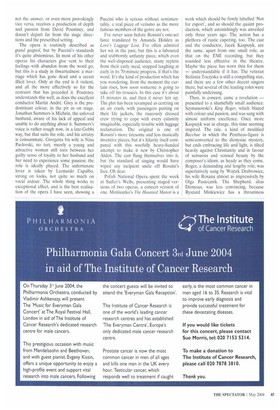A study in frustration
Michael Tanner
II Tabarro; Love's Luggage Lost Opera North The Haunted Manor; King Roger Polish National Opera
Do you fancy having an early supper and then going to a short opera? Or what about going to a short opera and getting home early, alternatively having a sophisticatedly late meal? Come to that, why not have an early supper, go for a constitutional and then have another meal before turning in, and forget about opera altogether? The first two alternatives are offered by Opera North, as a way of cajoling you into seeing something without the pain that they take it you will associate with the artform they exist to propagate. Why make opera sound so arduous? And if it is, what is wrong with that? It's a gruesome commentary on our cultural condition that a noble opera company should seek to sugar what it sees as its pills in this way.
Of the second two operas in the 'Eight Little Greats' series, one is done extremely well, the other was for me a nightmare — I'd strongly suggest booking a meal for about 8.30. Puccini's II Tabarro, sung in Italian with the approximate surtitles which sometimes translate a question but not the answer, or even more provokingly vice versa, receives a production of depth and passion from David Pountney, and doesn't depart far from the stage directions and the prescribed setting.
The opera is routinely described as grand guignol, but by Puccini's standards it's quite abstemious. In most of his other operas his characters give vent to their feelings with abandon from the word go, but this is a study in thwartedness: a marriage which has gone dead and a secret illicit lover. Only at the end is it violent, and all the more effectively so for the restraint that has preceded it. Pountney understands this well, as does the excellent conductor Martin Andre. Grey is the predominant colour, in the pit as on stage. Jonathan Summers is Michele, the unloved husband, aware of his lack of appeal and unable to do anything about it. Summers's voice is rather rough now, in a late-Gobbi way, but that suits the role, and his artistry is consummate. Giorgetta his wife is Nina Pavlovski, no tart, merely a young and attractive woman still torn between her guilty sense of loyalty to her husband and her need to experience some passion: the role is ideally played. The unfortunate lover is taken by Leonardo Capalbo, strong on looks, not quite so much on vocal ardour, The whole thing works to exceptional effect, and is the best realisation of the opera I have seen, showing a Puccini who is serious without sentimentality. a real piece of verismo as the more famous members of the genre are not.
I've never seen before Rossini's one-act farce translated by Amanda Holden as Love's Luggage Lost, I've often admired her wit in the past, but this is a laboured and stubbornly unfunny piece, which even the well-disposed audience, many replete from their early meal, stopped laughing at early in its 70-minute progress, if that's the word. It's the kind of production which has you wondering, from the moment the curtain rises, how soon someone is going to take off his trousers. In this case it's about 15 minutes in, and then it never lets up. The plot has been revamped as centring on an air crash, with passengers putting on their life jackets, the raucously dressed crew trying to cope with every calamity imaginable, especially trouble with luggage reclamation. The original is one of Rossini's more tiresome and less musically inventive pieces, but it's hilarity itself compared with this woefully heavy-handed attempt to make it new by Christopher Alden. The cast flung themselves into it, but the standard of singing would have wiped any incipient smile off Rossini's face. Oh dear.
Polish National Opera spent the week at Sadler's Wells, presenting staged versions of two operas, a concert version of one. Moniuszko's The Haunted Manor is a work which should be firmly labelled 'Not for export', and so should the quaint production, which astonishingly was unveiled only three years ago. The action has a plethora of rustic capering, too. The cast and the conductor, Jacek Kaspszyk, are the same, apart from one small role, as that on the EMI recording, but they sounded less effective in the theatre. Maybe the piece has worn thin for them — understandable if it has. The veteran Stefania Toczyska is still a compelling star, and there are a few other decent singers there, but several of the leading roles were painfully undersung.
Then, in concert, came a revelation — presented to a shamefully small audience: Szy, manowski's King Roger, which blazed with colour and passion, and was sung with almost uniform excellence. Once more Kaspszyk was in charge, this time seeming inspired. The tale, a kind of modified Bacchae in which the Pentheus-figure is semi-converted to the dionysiac mystery, but ends embracing life and light, is tilted heavily against Christianity and in favour of sensuous and sensual beauty by the composer's idiom, as heady as they come. Roger, a demanding and lengthy role, was superlatively sung by Wojtek Drabrowicz, his wife Roxana almost as impressively by Olga Pasiecznik, The Shepherd, alias Dionysus, was less convincing, because Ryszard Minkiewicz has a throatiness which partially undermined his ecstatic blandishments. It hardly mattered, in the grand tide of the work, as it swept towards a climax extraordinarily similar to that of Schoenberg's Gurrelieder, and with the same object of adored celebration, the Sun. I'll report on Penderecki's Ulm Rex next week.




































































 Previous page
Previous page